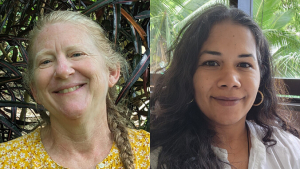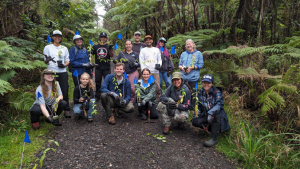Two University of Hawaiʻi faculty are being recognized for their work on addressing how environmental policies related to climate change impact diverse populations, particularly Indigenous communities.
Poonam Keral, a faculty member of the UH Mānoa College of Tropical Agriculture and Human Resources, and Pamela Scheffler, a professor of Geography, Biology and Environmental Science at Hawaiʻi Community College, have been awarded the 2024–25 Forest Service Overseas Environmental Experience (FORSEE) faculty fellowship. Of the six faculty chosen for this fellowship nationally, two are from the UH System.

This highly competitive program will offer Keral and Scheffler an opportunity to engage in field experiences across Botswana, Mexico, India and Atlanta, Georgia.
“I was incredibly honored to learn I was selected for this prestigious fellowship,” said Keral, of the Department of Natural Resources and Environmental Management (NREM). “It will allow me to delve deeper into critical issues like resource equity, access to natural resources for communities, and how environmental justice is unfolding around the world.”
“I am looking forward to adding content that I learn during this fellowship year into the courses that I will teach next year and beyond, teaching what I learn to the next generation,” said Scheffler, who is also a two-time Fulbright recipient. “I believe that working on this fellowship with Dr. Poonam Keral will allow us to expand that pathway, encouraging more of our local students to study for higher degrees at Mānoa.”
 Scheffler with students doing fieldwork.
Scheffler with students doing fieldwork.
The research will focus on gender equity, community-based resource management and global conservation efforts. Keral and Scheffler envision cultivating a network of global environmental professionals. By collaborating with local and international experts, they endeavor to provide research opportunities, fieldwork initiatives, and exchange programs for students and faculty.
“I plan to develop a new NREM course based on these learnings,” Keral said. “This course could potentially lead to international internships and study opportunities for our students, fostering collaboration with communities and agencies worldwide. Additionally, a co-created podcast with local populations, leaders and officials will bring real-world experiences and a deeper understanding of the interconnectedness of global environmental issues to our students.”
“I believe that the connections we make through this program will lead to interesting results for us and others in the UH System,” said Scheffler.
The FORSEE faculty fellowship is funded by USAID‘s Diversity, Equity, Inclusion, and Accessibility Office in collaboration with the U.S. Forest Service International Programs.